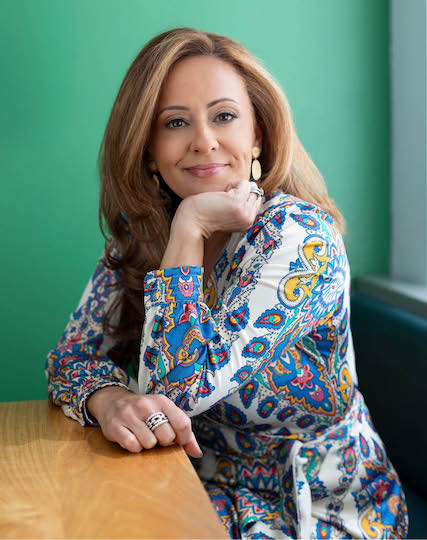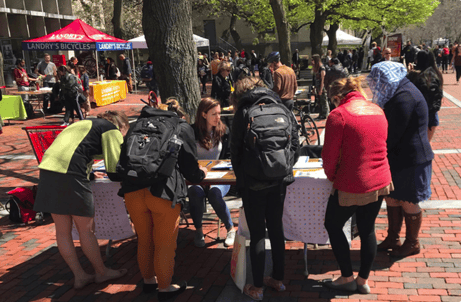
We get it. Especially around the holidays, many people tend to avoid conversations that they perceive to be controversial: whether that be politics, personal life, or the climate crisis. But the recent uptick in understanding and concern about the latter provides the opportunity for climate conversations with friends and family to not only be uncontroversial, but productive in facilitating positive climate action. 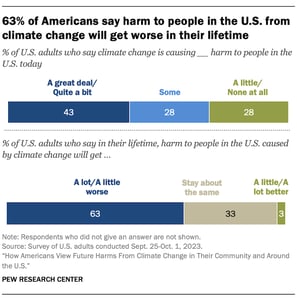
In a world grappling with the urgency of climate change, many have yet to bring the discussion away from the news reels and to the kitchen table. New research demonstrates that a majority of Americans think climate change is causing harm to people in the United States, and 63% of Americans expect things to get worse in their lifetime. But even with climate concern at an all-time high, only 37% of Americans say they discuss climate change with family or friends even occasionally. But talking to those close to us is the best way to change hearts and minds on taking climate action. In fact, 90% of people most trust their family and friends for information.
There is a scientifically proven method to navigate these conversations without sparking heated debates or awkward silences: storytelling. While statistics often seem like they may be the most compelling, statistics tend to start arguments while stories drive action. When compared to receiving information in other forms, good stories increase neural activity in the brain fivefold, meaning storytelling literally alters our brain chemistry. Additionally, hearing information in the form of captivating stories increases attention, empathy, and retention within listeners. In short, stories make us care, and they make us remember.
What Makes a Good Story?
We only reap the benefits of a good story if the narrative is just that – good. For people to remember and empathize with climate stories, they need to evoke empathy and emotion. That means the people you’re speaking to need to see themselves in the story you tell.
The key? Know your audience and know your context. Make sure your story truly does have the right characters, setting, and plot to resonate with the person (or people) that you are talking to. That means identifying shared values and interests before leading into a problem, solution, and specific steps your audience -- from your business-savvy cousin to your hiking-enthused neighbor -- can take to get more involved or informed on sustainable action.
While the right time to bring up climate action is truly any time, here’s a few key opportunities for climate conversations that most Americans will run into on a regular basis – even around the table for a holiday dinner.
Opportunities for Everyday Climate Storytelling
Opportunity 1: “Crazy weather we’ve been having, huh?”
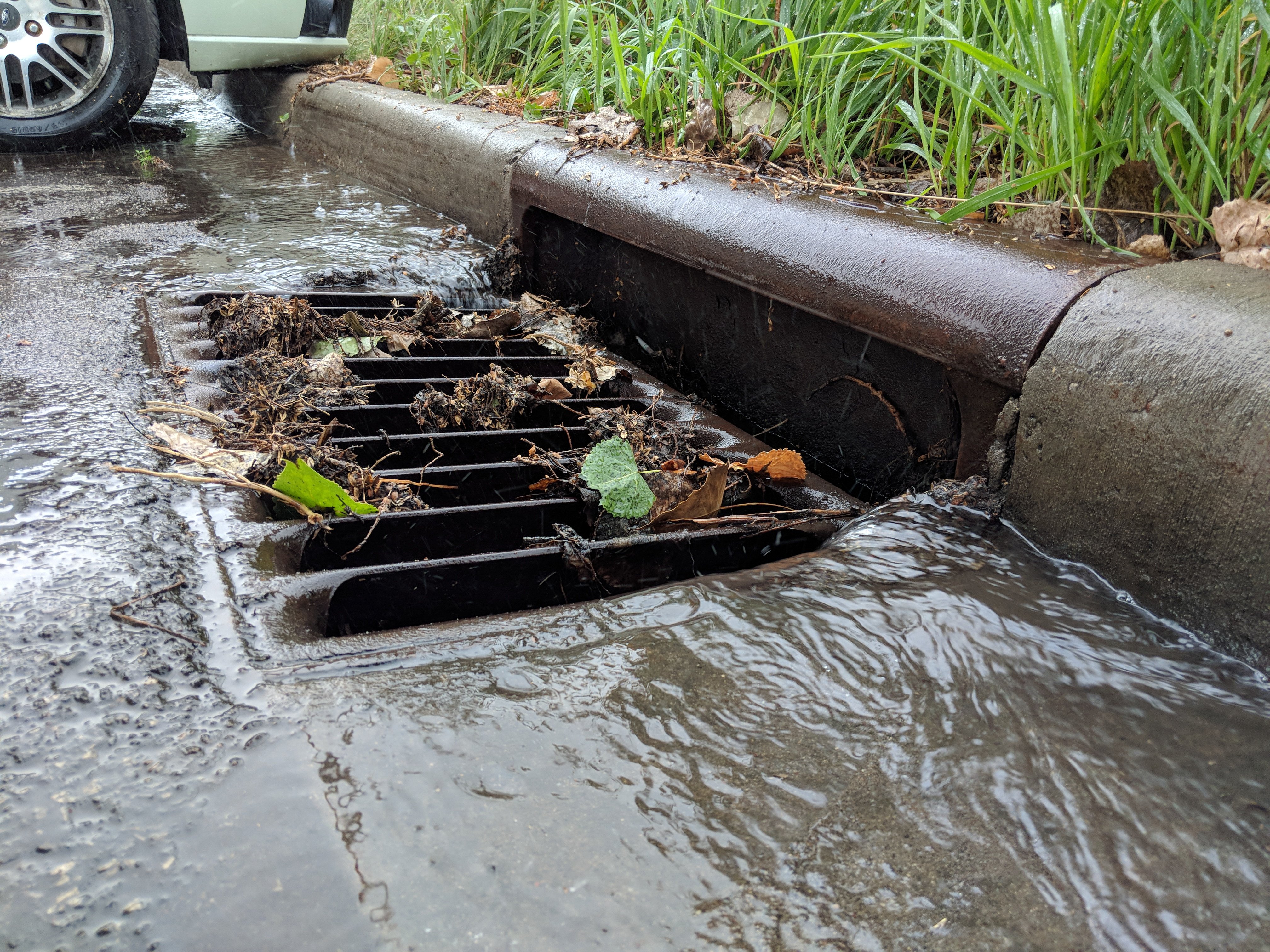
Gone are the days when talking about the weather was a two-sentence conversation. As climate change makes extreme heat, cold, and storms both more intense and more frequent, that “crazy weather” has serious impacts on humans and ecosystems. Bring small talk about the weather to the next level by sharing personal or community anecdotes about how these shifts have affected health, from heightened seasonal allergies to respiratory issues and heatstroke.
Remember: not all climate stories need to be doom-and-gloom. Stay focused on positive outcomes by emphasizing how tackling climate change will protect current and future generations – bringing bluer skies and greener pastures (literally!).
Opportunity 2: “My bills seem to be getting so much higher recently”/ “Gas prices are too high!”
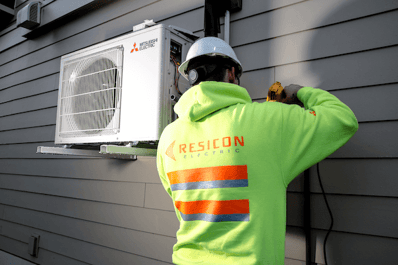
The climate crisis hits home in a variety of places, but one key impact is on our wallets. Talking with family or friends about higher electric and gas bills is a great opportunity to offer alternatives that are better for the environment and easier on the pocketbook. Many people don’t make the switch to electric home options (like heat pumps!) or electric vehicles because they are unsure of their efficacy or nervous about pricing.
The strongest stories in this case are success stories. Talk about your own experience, or that of others who you know, in which making the switch to electric was easy, effective, and inexpensive. Walk others through the process from start to finish, including information about available rebates in your area, the process of installation, and the benefits enjoyed by those who have made the switch Given the large amount of misinformation about home and vehicle electrification, ask questions to find out what their concerns are, and be prepared with answers.
Opportunity 3: “Have you been able to get into any hiking/skiing/hunting this season?”
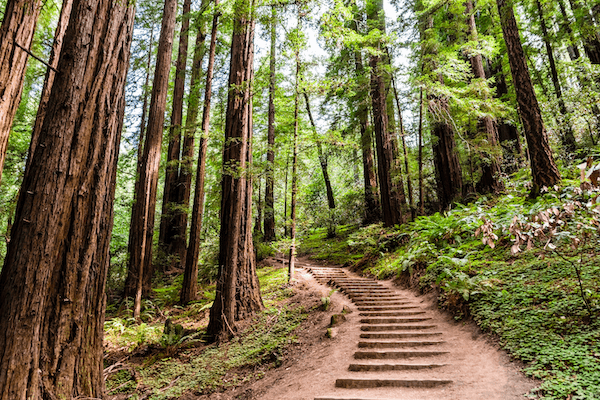
It’s true: one of the easiest ways to talk about sustainability is to jump into conversations about the environment. If your family or friends love hunting, hiking, fishing, or birdwatching, it can be helpful to point to climate’s impacts on ecosystems and biodiversity. As global temperatures increase, disasters like wildfires and floods rise, and waste pollutes our air and water, local wildlife populations decline as species migrate away or fail to survive in their habitats.
Focus on specific areas of nature, animals, or activities that you know your audience enjoys, and stay centered on the positives. Discuss what measures can be taken to protect your favorite species or hobby and provide ways that people can decrease their footprint and even volunteer to help clean up local nature conservatories. Remember that anything can be an entry point to climate action: someone who starts paying attention to climate change because of their interest in hunting can become a proud EV owner, heat pump enthusiast, or garden composter by next year.
--
Climate conversations, and the stories told within them, will be a driving force in climate action that can bring more people to match the urgency of action that the climate crisis demands. See more resources on climate stories and conversations:
- KLA’s free Climate Conversation Guide
- Potential Energy Coalition’s Talk Like a Human: Lessons on How to Communicate Climate Change
- Storytelling for Social Change Messaging Brief

